Premium Only Content
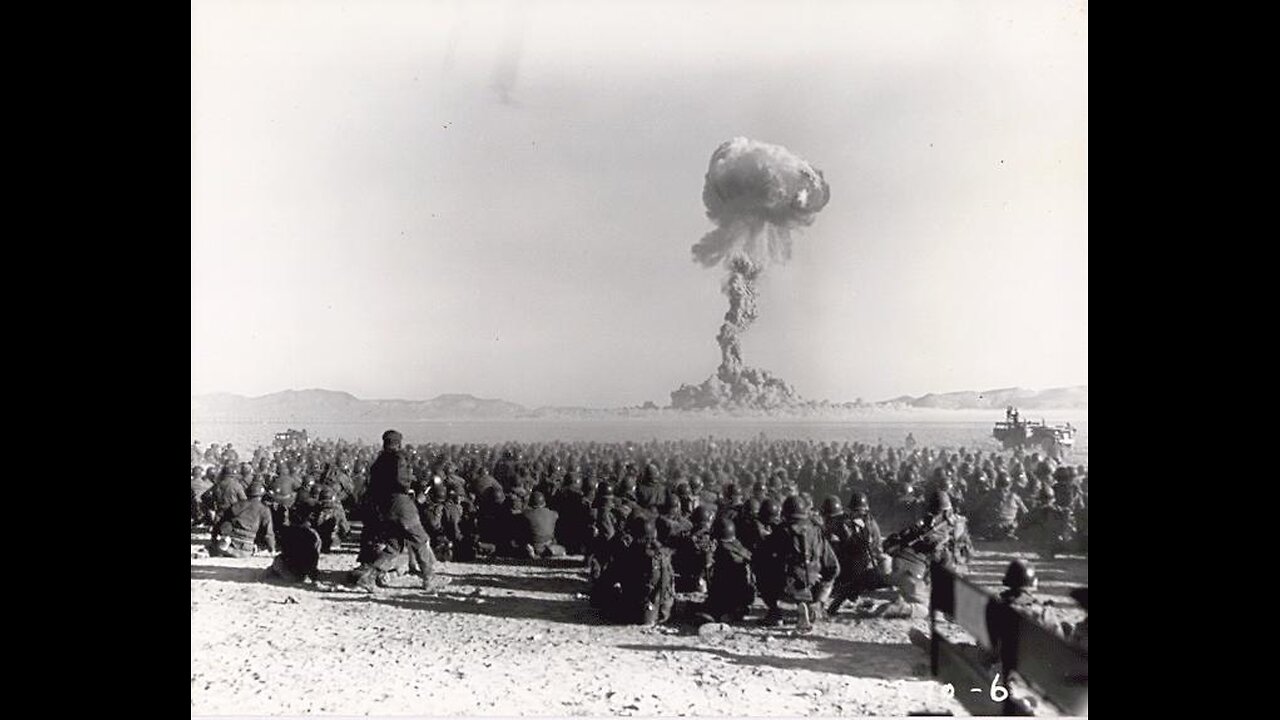
The Threats to Survival Which We Face
The dark side of history: https://thememoryhole.substack.com/
George Wald (November 18, 1906 – April 12, 1997) was an American scientist and activist who studied pigments in the retina. He won a share of the 1967 Nobel Prize in Physiology or Medicine with Haldan Keffer Hartline and Ragnar Granit.[1]
In 1970, Wald predicted that “civilization will end within 15 or 30 years unless immediate action is taken against problems facing mankind.”[2][3][4]
Research
Wald plotted the absorbance of rod pigment (black curve), then later the absorbance of cone pigments (red, green, and blue curves)
As a postdoctoral researcher, Wald discovered that vitamin A was a component of the retina. His further experiments showed that when the pigment rhodopsin was exposed to light, it yielded the protein opsin and a compound containing vitamin A. This suggested that vitamin A was essential in retinal function.
In the 1950s, Wald and his colleagues used chemical methods to extract pigments from the retina. Then, using a spectrophotometer, they were able to measure the light absorbance of the pigments. Since the absorbance of light by retina pigments corresponds to the wavelengths that best activate photoreceptor cells, this experiment showed the wavelengths that the eye could best detect. However, since rod cells make up most of the retina, what Wald and his colleagues were specifically measuring was the absorbance of rhodopsin, the main photopigment in rods. Later, with a technique called microspectrophotometry, he was able to measure the absorbance directly from cells, rather than from an extract of the pigments. This allowed Wald to determine the absorbance of pigments in the cone cells (Goldstein, 2001).
Biography
George Wald with wife Ruth Hubbard in 1967
George Wald was born in New York City, the son of Ernestine (Rosenmann) and Isaac Wald, Jewish immigrant parents. He was a member of the first graduating class of the Brooklyn Technical High School in New York in 1923. He received his Bachelor of Science degree from New York University in 1927 and his PhD in zoology from Columbia University in 1932. After graduating, he received a travel grant from the US National Research Council. Wald used this grant to work in Germany with Otto Heinrich Warburg where he identified vitamin A in the retina. Wald then went on to work in Zürich, Switzerland with the discoverer of vitamin A, Paul Karrer. Wald then worked briefly with Otto Fritz Meyerhof in Heidelberg, Germany, but left Europe for the University of Chicago in 1933 when Adolf Hitler came to power and life in Europe became more dangerous for Jews. In 1934, Wald went to Harvard University where he became an instructor, then a professor.
Wald was elected to the American Academy of Arts and Sciences in 1948.[5] He was elected to the National Academy of Sciences in 1950, the American Philosophical Society in 1958,[6] and in 1967 was awarded the Nobel Prize for Physiology or Medicine for his discoveries in vision. In 1966 he was awarded the Frederic Ives Medal by the OSA and in 1967 the Paul Karrer Gold Medal of the University of Zurich.[7]
Duration: 28 minutes and 3 seconds.28:03
Wald discussing the likelihood of life on other planets in Who's Out There? (1973).
Wald spoke out on many political and social issues and his fame as a Nobel laureate brought national and international attention to his views. He was a pacifist and vocal opponent of the Vietnam War and the nuclear arms race. Speaking at MIT in 1969 Wald said, "Our government has become preoccupied with death, with the business of killing and being killed."[8] In 1980, Wald served as part of Ramsey Clark's delegation to Iran during the Iran hostage crisis.
With a small number of other Nobel laureates, he was invited in 1986 to fly to Moscow to advise Mikhail Gorbachev on a number of environmental questions. While there, he questioned Gorbachev about the arrest, detention and exile of Yelena Bonner and her husband, fellow Nobel laureate Andrei Sakharov (Peace prize, 1975). Wald reported that Gorbachev said he knew nothing about it. Bonner and Sakharov were released shortly thereafter, in December 1986.
A member of the Circumcision resource center in Boston, he was one of the first scientists committed against circumcision but his article "Circumcision", rejected by the New York Times in 1975, was published in 2012 only by an English magazine (http://churchandstate.org.uk/2012/12/what-jewish-nobelist-george-wald-had-to-say-about-circumcision/ Archived September 21, 2020, at the Wayback Machine).
Wald died in Cambridge, Massachusetts. He was married twice: in 1931 to Frances Kingsley (1906–1980) and in 1958 to the biochemist Ruth Hubbard. He had two sons with Kingsley—Michael and David; he and Hubbard had a son—the award-winning musicologist and musician Elijah Wald—and a daughter, Deborah, a prominent family law attorney. He was an atheist.[9][unreliable source?]
See also
List of Jewish Nobel laureates
Retinal
References
The Nobel Foundation. "The Nobel Prize in Physiology or Medicine 1967". Nobelprize.org. Nobel Media AB 2014. Retrieved December 12, 2015.
Walter E. Williams (2015). American Contempt for Liberty. Hoover Institution Press. p. 374. ISBN 978-0817918750. Retrieved November 15, 2021.
Mark J. Perry (April 21, 2015) 18 spectacularly wrong apocalyptic predictions made around the time of the first Earth Day in 1970, expect more this year. aei.org
"The End of Civilization Feared by Biochemist". The New York Times. November 19, 1970. ISSN 0362-4331. Retrieved May 24, 2022.
"George Wald". American Academy of Arts & Sciences. Retrieved December 16, 2022.
"APS Member History". search.amphilsoc.org. Retrieved December 16, 2022.
"List of Recipients". University of Zurich. Archived from the original on July 21, 2015. Retrieved December 5, 2015.
Norman Solomon (September 6, 2010) A Speech for Endless War. zcommunications.org
Donald E. Johnson (2010). Programming of Life. Big Mac Publishers. p. 123. ISBN 9780982355466. "Biologist George Wald dismissed anything besides physicalism with, "I will not believe that philosophically because I do not want to believe in God. Therefore, I choose to believe in that which I know is scientifically impossible: spontaneous generation arising to evolution."
Further reading
Goldstein, B. 2001. Sensation and Perception, 6th ed. London: Wadsworth.
Dowling, John E (December 2002). "George Wald, 18 November 1906 – 12 April 1997". Proceedings of the American Philosophical Society. 146 (4). United States: 431–9. ISSN 0003-049X. PMID 12619664.
Hubbard, R; Wald E (2007). "George Wald Memorial Talk". Novartis Foundation Symposium 224 - Rhodopsins and Phototransduction. Novartis Foundation Symposia. Vol. 224. England. pp. 5–18, discussion 18–20. doi:10.1002/9780470515693.ch2. ISBN 9780470515693. ISSN 1528-2511. PMID 10614043.
Raju, T N (August 1999). "The Nobel Chronicles. 1967: George Wald (1906–97); Ragnar A Granit (1900–91); and Haldan Keffer Hartline (1903–83)". Lancet. 354 (9178). England: 605. doi:10.1016/S0140-6736(05)77968-X. ISSN 0140-6736. PMID 10470741. S2CID 53297408.
Jukes, T H (July 1997). "George Wald believed in apocalypse now". Nature. 388 (6637). England: 13. Bibcode:1997Natur.388S..13.. doi:10.1038/40251. PMID 9214489. S2CID 205027479.
Dowling, J E (May 1997). "George Wald (1906–97)". Nature. 387 (6631). England: 356. Bibcode:1997Natur.387..356D. doi:10.1038/387356a0. PMID 9163416. S2CID 4322440.
"Nutrition classics. The Journal of General Physiology, Volume eighteenth 1935: Vitamin A in eye tissues. By George Wald". Nutr. Rev. 43 (8). United States: 244–6. August 1985. doi:10.1111/j.1753-4887.1985.tb02437.x. ISSN 0029-6643. PMID 3900823. S2CID 1091402.
Dowling, J E; Wald G (March 1981). "Nutrition classics. Proceedings of the National Academy of Sciences of the United States of America, Volume 46, 1960: The biological function of vitamin A acid: John E. Dowling and George Wald". Nutr. Rev. 39 (3). United States: 134–8. doi:10.1111/j.1753-4887.1981.tb06752.x. ISSN 0029-6643. PMID 7027100.
Sulek, K (July 1969). "Nobel prize for George Wald, Haldan Keffer Hartline and Ragner Granit in 1967 for discoveries concerning the primary biochemical and physiological phenomena occurring in the process of vision". Wiad. Lek. 22 (13). Poland: 1258–9. ISSN 0043-5147. PMID 4897321.
Bouman, M A (January 1968). "Ragnar Garnit, Haldan Keffer Hartline, George Wald, winners of the Nobel Prize in physiology and medicine". Nederlands Tijdschrift voor Geneeskunde. 112 (1). Netherlands: 23–5. ISSN 0028-2162. PMID 4875782.
Mikulski, T; Zaki El-Sabban, M.; Zwolinski, Bruno J. (1968). "Noble laureate prize in the field of medicine for 1967: G. Wald, R. Granit, and H. K. Hartline". Postepy Biochem. 14 (3). Poland: 473. Bibcode:1968MolPh..14..473K. doi:10.1080/00268976800100591. ISSN 0032-5422. PMID 4879756.
Dowling, J E; Ratliff F (October 1967). "Nobel prize: 3 named for medicine, physiology award (George Wald, Ragnar Granit and Haldan Keffer Hartline)". Science. 158 (3800). United States: 468–73. Bibcode:1967Sci...158..468D. doi:10.1126/science.158.3800.468. ISSN 0036-8075. PMID 4860394. S2CID 177926314.
"George Wald". Am. J. Ophthalmol. 40 (5 Part 2): 4–7. November 1955. ISSN 0002-9394. PMID 13268547.
External links
Wikimedia Commons has media related to George Wald.
George Wald on Nobelprize.org Edit this at Wikidata
John E. Dowling, "George Wald, 1906–1997: A Biographical Memoir" in Biographical Memoirs, Washington, D.C.: The National Academy Press (National Academy of Sciences), Volume 78, 298:317.
A remembrance by his son Elijah
Papers of George Wald : an inventory
Two of George Wald's speeches can be read on-line:
A Generation in Search of a Future
The Origin of Death
vte
Laureates of the Nobel Prize in Physiology or Medicine
1901–1925
1901: Emil Behring 1902: Ronald Ross 1903: Niels Finsen 1904: Ivan Pavlov 1905: Robert Koch 1906: Camillo Golgi / Santiago Ramón y Cajal 1907: Alphonse Laveran 1908: Élie Metchnikoff / Paul Ehrlich 1909: Emil Kocher 1910: Albrecht Kossel 1911: Allvar Gullstrand 1912: Alexis Carrel 1913: Charles Richet 1914: Róbert Bárány 1915 1916 1917 1918 1919: Jules Bordet 1920: August Krogh 1921 1922: Archibald Hill / Otto Meyerhof 1923: Frederick Banting / John Macleod 1924: Willem Einthoven 1925
1926–1950
1926: Johannes Fibiger 1927: Julius Wagner-Jauregg 1928: Charles Nicolle 1929: Christiaan Eijkman / Frederick Gowland Hopkins 1930: Karl Landsteiner 1931: Otto Warburg 1932: Charles Scott Sherrington / Edgar Adrian 1933: Thomas Morgan 1934: George Whipple / George Minot / William Murphy 1935: Hans Spemann 1936: Henry Dale / Otto Loewi 1937: Albert Szent-Györgyi 1938: Corneille Heymans 1939: Gerhard Domagk 1940 1941 1942 1943: Henrik Dam / Edward Doisy 1944: Joseph Erlanger / Herbert Gasser 1945: Alexander Fleming / Ernst Chain / Howard Florey 1946: Hermann Muller 1947: Carl Cori / Gerty Cori / Bernardo Houssay 1948: Paul Müller 1949: Walter Hess / António Egas Moniz 1950: Edward Kendall / Tadeusz Reichstein / Philip Hench
1951–1975
1951: Max Theiler 1952: Selman Waksman 1953: Hans Krebs / Fritz Lipmann 1954: John Enders / Thomas Weller / Frederick Robbins 1955: Hugo Theorell 1956: André Cournand / Werner Forssmann / Dickinson W. Richards 1957: Daniel Bovet 1958: George Beadle / Edward Tatum / Joshua Lederberg 1959: Severo Ochoa / Arthur Kornberg 1960: Frank Burnet / Peter Medawar 1961: Georg von Békésy 1962: Francis Crick / James Watson / Maurice Wilkins 1963: John Eccles / Alan Hodgkin / Andrew Huxley 1964: Konrad Bloch / Feodor Lynen 1965: François Jacob / André Lwoff / Jacques Monod 1966: Francis Rous / Charles B. Huggins 1967: Ragnar Granit / Haldan Hartline / George Wald 1968: Robert W. Holley / Har Khorana / Marshall Nirenberg 1969: Max Delbrück / Alfred Hershey / Salvador Luria 1970: Bernard Katz / Ulf von Euler / Julius Axelrod 1971: Earl Sutherland Jr. 1972: Gerald Edelman / Rodney Porter 1973: Karl von Frisch / Konrad Lorenz / Nikolaas Tinbergen 1974: Albert Claude / Christian de Duve / George Palade 1975: David Baltimore / Renato Dulbecco / Howard Temin
1976–2000
1976: Baruch Blumberg / Daniel Gajdusek 1977: Roger Guillemin / Andrew Schally / Rosalyn Yalow 1978: Werner Arber / Daniel Nathans / Hamilton O. Smith 1979: Allan Cormack / Godfrey Hounsfield 1980: Baruj Benacerraf / Jean Dausset / George Snell 1981: Roger Sperry / David H. Hubel / Torsten Wiesel 1982: Sune Bergström / Bengt I. Samuelsson / John Vane 1983: Barbara McClintock 1984: Niels Jerne / Georges Köhler / César Milstein 1985: Michael Brown / Joseph L. Goldstein 1986: Stanley Cohen / Rita Levi-Montalcini 1987: Susumu Tonegawa 1988: James W. Black / Gertrude B. Elion / George H. Hitchings 1989: J. Michael Bishop / Harold E. Varmus 1990: Joseph Murray / E. Donnall Thomas 1991: Erwin Neher / Bert Sakmann 1992: Edmond Fischer / Edwin G. Krebs 1993: Richard J. Roberts / Phillip Sharp 1994: Alfred G. Gilman / Martin Rodbell 1995: Edward B. Lewis / Christiane Nüsslein-Volhard / Eric F. Wieschaus 1996: Peter C. Doherty / Rolf M. Zinkernagel 1997: Stanley B. Prusiner 1998: Robert F. Furchgott / Louis Ignarro / Ferid Murad 1999: Günter Blobel 2000: Arvid Carlsson / Paul Greengard / Eric Kandel
2001–present
2001: Leland H. Hartwell / Tim Hunt / Paul Nurse 2002: Sydney Brenner / H. Robert Horvitz / John E. Sulston 2003: Paul Lauterbur / Peter Mansfield 2004: Richard Axel / Linda B. Buck 2005: Barry Marshall / Robin Warren 2006: Andrew Fire / Craig Mello 2007: Mario Capecchi / Martin Evans / Oliver Smithies 2008: Harald zur Hausen / Luc Montagnier / Françoise Barré-Sinoussi 2009: Elizabeth Blackburn / Carol W. Greider / Jack W. Szostak 2010: Robert G. Edwards 2011: Bruce Beutler / Jules A. Hoffmann / Ralph M. Steinman (posthumously) 2012: John Gurdon / Shinya Yamanaka 2013: James Rothman / Randy Schekman / Thomas C. Südhof 2014: John O'Keefe / May-Britt Moser / Edvard Moser 2015: William C. Campbell / Satoshi Ōmura / Tu Youyou 2016: Yoshinori Ohsumi 2017: Jeffrey C. Hall / Michael Rosbash / Michael W. Young 2018: James P. Allison / Tasuku Honjo 2019: Gregg L. Semenza / Peter J. Ratcliffe / William Kaelin Jr. 2020: Harvey J. Alter / Michael Houghton / Charles M. Rice 2021: David Julius / Ardem Patapoutian 2022: Svante Pääbo 2023: Katalin Karikó / Drew Weissman
vte
1967 Nobel Prize laureates
Chemistry
Manfred Eigen (Germany) Ronald George Wreyford Norrish (Great Britain) George Porter (Great Britain)
Literature (1967)
Miguel Ángel Asturias (Guatemala)
Peace (1967)
None
Physics
Hans Bethe (United States)
Physiology or Medicine
Ragnar Granit (Sweden) Haldan Keffer Hartline (United States) George Wald (United States)
Nobel Prize recipients
1962
1963
1964
1965
1966
1967
1968
1969
1970
1971
1972
vte
Eli Lilly Award in Biological Chemistry
William M. Allen (1935) Harold S. Alcott (1937) Abraham White (1938) George Wald (1939) Eric G. Ball (1940) David Rittenberg (1941) Earl A. Evans, Jr. (1942) Herbert E. Carter (1943) Joseph S. Fruton (1944) Max A. Lauffer (1945) John D. Ferry (1946) Sidney Colowick (1947) Dilworth Woodley (1948) Irving M. Klotz (1949) William Shive (1950) John M. Buchanan (1951) David M. Bonner (1952) Nathan O. Kaplan (1953) Harvey Itano (1954) William F. Neuman (1955) Robert A. Alberty (1956) Harold A. Scheraga (1957) Lester J. Reed (1958) Paul Berg (1959) James Watson (1960) Frederick Crane (1961) Jerard Hurwitz (1962) William P. Jencks (1963) Bruce Ames (1964) Gerald M. Edelman (1965) Phillips W. Robbins (1966) Gordon G. Hammes (1967) Charles C. Richardson (1968) Mario R. Capecchi (1969) Lubert Stryer (1970) David F. Wilson (1971) Bruce M. Alberts (1972) C. Fred Fox (1973) James E. Dahlberg (1974) Mark Ptashne (1975) Joan A. Steitz (1976) Robert G. Roeder (1977) Charles R. Cantor (1978) Christopher T. Walsh (1979) Phillip A. Sharp (1980) Roger D. Kornberg (1981) Harold M. Weintraub (1982) Richard Axel (1983) David V. Goeddel (1984) Gerald M. Rubin (1985) James E. Rothman (1986) Jacqueline K. Barton (1987) Peter Walter (1988) Michael M. Cox (1989) George L. McLendon (1990) Peter G. Schultz (1991) William DeGrado (1992) Stuart L. Schreiber (1993) Peter S. Kim (1994) Jeremy M. Berg (1995) Gregory L. Verdine (1996) Alanna Schepartz (1997) John Kuriyan (1998) Chaitan Khosla (1999) Xiaodong Wang (2000) Jennifer Doudna (2001) Kevan M. Shokat (2002) Andreas Matouschek (2003) Benjamin Cravatt III (2004) Dewey G. McCafferty (2005) Linda Hsieh-Wilson (2006) Anna K. Mapp (2007) Paul J. Hergenrother (2008) Scott K. Silverman (2009) Alice Y. Ting (2010) Nathanael Gray (2011) Christopher J. Chang (2012) Matthew D. Disney (2013) Yi Tang (2014) Minkui Luo (2015) Elizabeth Nolan (2016) Howard Hang (2017) Bradley Pentelute (2018) Neal K. Devaraj (2019) Yimon Aye (2020) Jordan L. Meier (2021)
Authority control databases Edit this at Wikidata
International
FAST ISNI VIAF
National
France BnF data Germany United States Australia Korea
People
Deutsche Biographie Trove
Other
SNAC IdRef
Categories:
1906 births1997 deathsAmerican anti–nuclear weapons activistsAmerican anti–Vietnam War activistsAmerican atheistsAmerican neuroscientistsAmerican Nobel laureatesAmerican tax resistersBrooklyn Technical High School alumniColumbia University alumniHarvard University facultyInstitute for Advanced Study visiting scholarsJewish American atheistsJewish American scientistsJewish neuroscientistsMembers of the American Philosophical SocietyMembers of the United States National Academy of SciencesNew York University alumniNobel laureates in Physiology or MedicineRecipients of the Albert Lasker Award for Basic Medical ResearchScientists from New York (state)Visual systemVision scientistsVitamin researchers
-
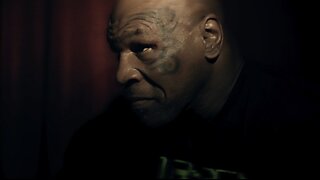 1:12
1:12
Mike Tyson
5 hours ago $17.68 earnedIt's a war.
70.1K29 -
 1:04:11
1:04:11
In The Litter Box w/ Jewels & Catturd
23 hours agoProsecute/Fauci | In the Litter Box w/ Jewels & Catturd – Ep. 692 – 11/15/2024
91.5K42 -
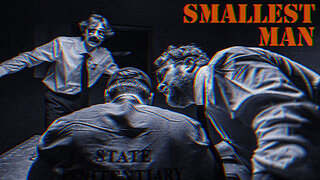 5:17
5:17
BFFs: Dave Portnoy, Josh Richards & Bri Chickenfry
9 days agoSmallest Man
245K24 -
 1:45:03
1:45:03
The Quartering
7 hours agoRFK Big Pharma Meltdown, Alex Jones WIN & Shadow Government To Oppose Trump!
128K44 -
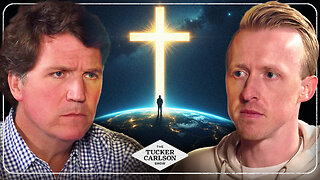 1:53:23
1:53:23
Tucker Carlson
7 hours agoFasting, Prayer, Meditation, & the Global Persecution of Christians (With Hallow CEO Alex Jones)
173K68 -
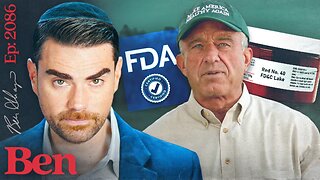 53:03
53:03
Ben Shapiro
7 hours agoEp. 2086 - It’s MAHA TIME: Trump Picks RFK Jr.
132K83 -
 57:03
57:03
Russell Brand
10 hours ago“I Can PROVE Biden Took CORRUPT Money From Ukraine” – Rudy Giuliani on The Biden Crime Family –SF494
207K182 -
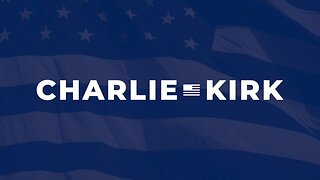 1:59:47
1:59:47
The Charlie Kirk Show
8 hours agoRFK's MAHA Agenda + The Trump Border Effect + Will The Senate Confirm? | Kane, Halperin | 11.15.24
191K53 -
 34:45
34:45
Athlete & Artist Show
6 days ago $5.80 earnedNCAA Officially Votes To Allow MAJOR JUNIOR Players!
83.9K3 -
 1:14:55
1:14:55
Mark Kaye
9 hours ago🔴 Is TRUMP the New George Washington of American Politics?
75.4K40